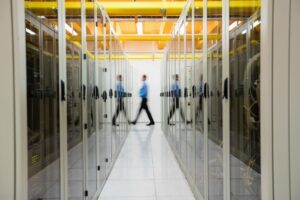6 Factors to Consider for Workload Automation Security
Learn More about the 6 essential factors to consider for ensuring strong workload automation security in your organization.

Automated workflows and business processes can give organizations a massive competitive edge. However, security concerns have only increased across the board: 56% of IT professionals say they have seen an increase in the number of attacks on their organization, with an almost identical increase in attack complexity and impact on their organization.
Will adding a workload automation tool, especially to a hybrid environment, make an organization more vulnerable?
No. In fact, quite the opposite. While managing a complex tech stack, IT teams face incompatible permissions, accounts, credentials, audit trails, and logging. Here’s how workload automation can be used to better manage IT complexity and help IT teams properly secure and control the entire environment.
Managed IT Complexity
Whether you have a hybrid environment with private cloud and on-premises applications or a fully cloud-native ecosystem, the right workload automation solution will automate processes and workflows across every platform. So instead of patchwork job scheduling or manual workflows, teams can realize orchestration across their entire platform from a single point of control. Whether you use SAP, Oracle, Microsoft, IBM, Amazon, or other applications, ActiveBatch’s REST API adapter ensures you can connect all your enterprise applications to securely bring together your tech stack.
Automation platforms will also work across cloud providers and operating systems. For example, ActiveBatch supports operating systems like Microsoft Windows, Linux, UNIX, IBM iSeries, HP NSK, OpenVMS, MacOS, and more.
Reduction In Human Error
Manual errors cost teams time, money, and safety: The Uptime Institute’s 2022 Global Data Center Survey found that human error is a contributing factor in 60-80% of data center outages. High availability workload automation software ensures reliability and also automates tasks commonly prone to human error. This reduces errors and security vulnerabilities across the enterprise and frees up security and DevOps teams to focus on higher-value, more strategic tasks.
Decrease In Problematic Workflows
Legacy job schedulers and workload schedulers hold back IT teams due to their lack of flexibility and scalability. Tools like ActiveBatch help optimize and streamline complex processes across a hybrid environment, consolidating other process automation tools into one centralized platform. This also enables easier support of scheduling object orchestration and incorporates data and dependencies for otherwise incompatible tools. And with constraint-based scheduling and automated handoffs, teams can customize scheduling for new job requirements without breaking existing automation.
Tighter Authentication Practices
Multi-factor authentication (MFA) is one of the strongest security tools an organization can use. MFA blocks more than 99% of automated cyberattacks, but 38% of large organizations and 87% of SMBs don’t use MFA.
But a workload automation solution that supports multi-factor authentication adds another layer of protection against unauthorized access. Tools like ActiveBatch support common authenticator apps like Google Authenticator, Microsoft Authenticator, Duo, and more.
Enterprise-Wide Compliance
Automation platforms like ActiveBatch make it easy for teams to implement policy-driven governance across their organization. With capabilities like revision history, policy authorizations, auditing, and advanced SLA management, tools like ActiveBatch give IT teams valuable insights into the system’s performance.
Plus, ActiveBatch integrates with access control tools to ensure additional security layers for all workload data. This allows security teams to easily control and monitor the behavior of security workflows, increasing transparency and control over systems, applications, and databases across their environment.
Secure Connections
Process automation tools must support secure connections between the job scheduler and scheduling endpoints. That’s why ActiveBatch supports both SSL and TLS secured connections. We also help enhance data security for file transfers and support protocols including SFTP, FTPS and web tunneling to encrypt sensitive data.
With the right workload automation solution, teams can gain the efficiency they need to gain a competitive advantage while ensuring strong security practices.
Frequently asked questions
There are many positive indicators of an automation platform that both supports and strengthens security. Make sure you find an automation provider that offers encrypted connections like SSL and TLS. Ensure it will integrate and support access controls, authentications, and compliance across your enterprise. Finally, find a solution that supports tooling across your enterprise and environment, whether that’s a multi-cloud, on-premise, or hybrid environment. Learn more about how ActiveBatch defends networks and prevents unauthorized access.
CA Workload Automation AE (AutoSys Edition) by Broadcom and ActiveBatch are both enterprise-grade workload automation solutions, but have a few key differentiators. AutoSys focuses heavily on command-line interfaces, which provide flexibility but make it more difficult to use. This results in not just a more difficult user experience but opens workflows up to errors and potential security issues stemming from those errors. Discover how ActiveBatch enables flexibility without sacrificing usability and security.
Yes. ActiveBatch provides seamless integrations for every environment across on-premises, hybrid, and multi-cloud infrastructure. This includes orchestration across on-premises mainframes and VMware, AWS EC2, Microsoft Azure, Google Cloud, and more. This allows IT teams to build dynamic, end-to-end workflows that reduce tasks, accelerate digital transformation, and bolster security. Explore how ActiveBatch provides intelligent infrastructure for every environment.







